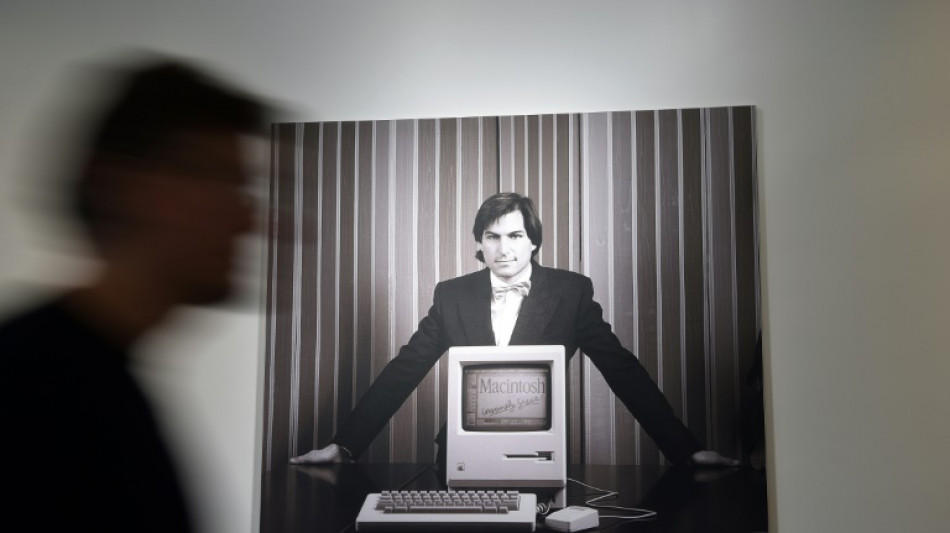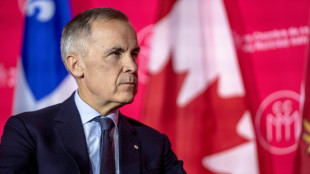
-
 Carney's Liberals pass budget, avoiding snap Canada election
Carney's Liberals pass budget, avoiding snap Canada election
-
LeBron back in training, edges closer to Lakers return

-
 Climate talks run into night as COP30 hosts seek breakthrough
Climate talks run into night as COP30 hosts seek breakthrough
-
Germany and Netherlands lock up World Cup spots in style

-
 Germany's Woltemade hopes for 2026 World Cup spot after scoring again
Germany's Woltemade hopes for 2026 World Cup spot after scoring again
-
Germany 'send message' with Slovakia rout to reach 2026 World Cup

-
 Trump unveils fast-track visas for World Cup ticket holders
Trump unveils fast-track visas for World Cup ticket holders
-
Netherlands qualify for World Cup, Poland in play-offs

-
 Germany crush Slovakia to qualify for 2026 World Cup
Germany crush Slovakia to qualify for 2026 World Cup
-
Stocks gloomy on earnings and tech jitters, US rate worries

-
 'In it to win it': Australia doubles down on climate hosting bid
'In it to win it': Australia doubles down on climate hosting bid
-
Former NFL star Brown could face 30 yrs jail for shooting case: prosecutor

-
 Fate of Canada government hinges on tight budget vote
Fate of Canada government hinges on tight budget vote
-
New research measures how much plastic is lethal for marine life

-
 Mbappe, PSG face off in multi-million lawsuit
Mbappe, PSG face off in multi-million lawsuit
-
EU defends carbon tax as ministers take over COP30 negotiations

-
 McCartney to release silent AI protest song
McCartney to release silent AI protest song
-
Stocks tepid on uncertainty over earnings, tech rally, US rates

-
 Louvre shuts gallery over ceiling safety fears
Louvre shuts gallery over ceiling safety fears
-
'Stranded, stressed' giraffes in Kenya relocated as habitats encroached

-
 US Supreme Court to hear migrant asylum claim case
US Supreme Court to hear migrant asylum claim case
-
Western aid cuts could cause 22.6 million deaths, researchers say

-
 Clarke hails Scotland 'legends' ahead of crunch World Cup qualifier
Clarke hails Scotland 'legends' ahead of crunch World Cup qualifier
-
S.Africa says 'suspicious' flights from Israel show 'agenda to cleanse Palestinians'

-
 South Korea pledges to phase out coal plants at COP30
South Korea pledges to phase out coal plants at COP30
-
Ex-PSG footballer Hamraoui claims 3.5m euros damages against club

-
 Mbappe, PSG in counterclaims worth hundreds of millions
Mbappe, PSG in counterclaims worth hundreds of millions
-
Two newly discovered Bach organ works unveiled in Germany

-
 Stocks lower on uncertainty over earnings, tech rally, US rates
Stocks lower on uncertainty over earnings, tech rally, US rates
-
Barca to make long-awaited Camp Nou return on November 22

-
 COP30 talks enter homestretch with UN warning against 'stonewalling'
COP30 talks enter homestretch with UN warning against 'stonewalling'
-
France makes 'historic' accord to sell Ukraine 100 warplanes

-
 Delhi car bombing accused appears in Indian court, another suspect held
Delhi car bombing accused appears in Indian court, another suspect held
-
Emirates orders 65 more Boeing 777X planes despite delays

-
 Ex-champion Joshua to fight YouTube star Jake Paul
Ex-champion Joshua to fight YouTube star Jake Paul
-
Bangladesh court sentences ex-PM to be hanged for crimes against humanity

-
 Trade tensions force EU to cut 2026 eurozone growth forecast
Trade tensions force EU to cut 2026 eurozone growth forecast
-
'Killed without knowing why': Sudanese exiles relive Darfur's past

-
 Stocks lower on uncertainty over tech rally, US rates
Stocks lower on uncertainty over tech rally, US rates
-
Death toll from Indonesia landslides rises to 18

-
 Macron, Zelensky sign accord for Ukraine to buy French fighter jets
Macron, Zelensky sign accord for Ukraine to buy French fighter jets
-
India Delhi car bomb accused appears in court

-
 Bangladesh ex-PM sentenced to be hanged for crimes against humanity
Bangladesh ex-PM sentenced to be hanged for crimes against humanity
-
Leftist, far-right candidates advance to Chilean presidential run-off

-
 Bangladesh's Hasina: from PM to crimes against humanity convict
Bangladesh's Hasina: from PM to crimes against humanity convict
-
Rugby chiefs unveil 'watershed' Nations Championship

-
 EU predicts less eurozone 2026 growth due to trade tensions
EU predicts less eurozone 2026 growth due to trade tensions
-
Swiss growth suffered from US tariffs in Q3: data

-
 Bangladesh ex-PM sentenced to death for crimes against humanity
Bangladesh ex-PM sentenced to death for crimes against humanity
-
Singapore jails 'attention seeking' Australian over Ariana Grande incident


Fit at 40: the revolutionary Apple Mac in numbers
Forty years ago Steve Jobs revolutionised personal computing by launching the Apple Macintosh, the first PC with a user-friendly mouse and graphical interface that helped the machines enter the everyday lives of people for the first time.
Jobs, playing the showman inventor to perfection in a black suit and silver bow tie, opened a zipper bag in an auditorium in Cupertino, California, on January 24, 1984, and lifted out a lightweight computer that not only operated at the click of a button but also, thrillingly, talked.
Here is a look back at Apple's revolutionary machine in numbers.
- One minute -
It all began two days before the official launch, at halftime during the Super Bowl, with a mysterious TV teaser advert.
The haunting clip shot by "Blade Runner" director Ridley Scott evokes a dystopian world in the style predicted by George Orwell in his classic novel, "1984".
Though no names were mentioned, the all-powerful "Big Brother" in the clip was a swipe at IBM, which dominated the market at the time.
The Mac was represented by an athlete, shown hurling a sledgehammer at that totalitarian future.
Apple paid a whopping $800,000 ($2.5 million in today's money) to air the one-minute ad, seen by 77.6 million TV viewers, according to ratings specialist Nielsen.
But it achieved its aim of creating huge hype around the launch.
- 128K -
The first Mac came with 128 kilobytes of memory space, one million times less than top-of-the-line MacBooks today.
At the outset, a lack of memory was a common problem with PCs. Within a year Apple had replaced the 128K version with the "Fat Mac" with 512K, offering four times the space.
- 7.5 kilos -
The machine's weight, which Jobs boasted at the launch its owners could carry on a plane, was much lighter than the competing IBM model of 11.3 kg (25 pounds).
Both offered a floppy disk drive, but only the compact Mac was all-in-one.
Today's laptops are featherweights in comparison, with the latest MacBook Airs and MacBook Pros all weighing in at under 2 kg.
- $2,495 -
"The most powerful, most portable, most versatile computer not-very-much money could buy," boasted the 20-page insert ad that ran in Newsweek magazine about the first Mac.
In fact, for a personal computer it was quite a lot of money: $2,495 in 1984 is the equivalent of around $7,400 today.
It was $1,000 more than Jobs had initially planned, but development costs, and the $15 million spent on advertising, caused its price to balloon.
These days vintage 128Ks can fetch up to $2,000 at auction.
- $500 -
Jobs, who went on to the father the iMac, the iPod and the iPhone among other generation-defining creations, seemed to have the Midas touch.
Even the cardboard box that the first Macs came in seemed to be made of gold -- or so it appeared when someone paid $536 in 2002 on eBay to acquire one such empty box, according to Wired magazine.
The winning bid beat 17 other offers.
- 370,000 units -
Within three months of its release, Apple had sold 50,000 Macs but sales really only took off after the release of the Fat Mac in October 1984.
According to tech historian Jeremy Reimer, by the end of the year 372,000 units of the history-making model had sold.
- 22 million units -
Fast forward 40 years and sales are many multiples of that.
In 2023, Apple sold nearly 22 million Macs, including iMac desktops and MacBooks, according to the latest available data from analysts at Gartner and IDC market research groups.
The figures give the company between 8 and 9 percent of the total market for PCs.
B.Mahmoud--SF-PST




